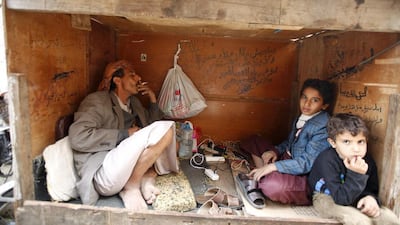When the UAE joined the Saudi-led coalition to restore Yemen’s internationally-recognised government, the focus was on bringing back stability and hope to millions of people who had seen far too little of either in recent years.
For me, this was not some abstract concept because the issue was personified by the dreams of two Yemeni women I met during the month I spent in the country in early 2009.
This was just as terrorism was about to bring the country’s period of relative stability to an abrupt end.
A few days after I’d watched the sun set over Shibam in the central Hadramawt, a group of Korean tourists were enjoying the same view when they were approached by a local youth, who asked to pose for a photograph with them. He turned out to be an Al Qaeda in the Arabian Peninsula member who detonated his explosives vest, killing four of the tourists and their Yemeni guide.
The incident exemplified the nature of the country, which seemed to vacillate between the poles of hope and despair. As I’d discovered, it featured hospitality that was lavish even by Arabian standards but also a minority of zealots who were willing to use violence to achieve their goals.
Most of the tourists in the country fled after that suicide bombing was followed by another in Sanaa a few days later.
But I stayed on, eventually travelling to the fortified mountain village of Kawkaban in the highlands north-west of Sanaa. This is where I met Fahia, whose family had turned part of their sprawling ancestral home into a hotel.
He was the essence of amiable hospitality and we spent hours chatting over tea in his mafrej, their equivalent of our majlis, where he made a habit of dropping alarming facts into ordinary conversations.
One such snippet was the presence of 18 Kalashnikovs in the house. Three were his – “It’s like a sign you’re an adult” – and while the only time they’d been fired was to celebrate weddings and similar events, he didn’t seem to understand why this profusion of assault rifles was in any way remarkable.
As I was digesting that, Fahia explained that when he was 24 years old, he had married an 11-year-old girl from the village. By the time she was 20, they had seven children.
But as I tried (and failed) to suppress my shocked reaction, it quickly became clear this was only part of a much more nuanced story.
Fahia’s two oldest children were girls and when they were approaching the age their mother was when her marriage was arranged, some of the men in the village began approaching Fahia to ask about marrying them.
He turned them down. The girls had expressed interest in going to university to study medicine because Kawkaban didn’t have a doctor and he supported them continuing their education.
Back in 2009, the daughters were in the final years of high school. The prospect of attending university in Sanaa was an opportunity that would have been not just unavailable to their mother one generation earlier but in all likelihood would also have been inconceivable.
They would have been undergraduates when the ructions of the Arab Spring reached Yemen. Over the years that followed, I thought of the sisters as I followed the news of president Ali Abdullah Saleh being eased from power and the GCC-supported process for a new governing structure, only for the country to descend into anarchy as the Iran-backed Houthi rebels joined with Saleh loyalist renegade army units to take over much of the country.
The sisters ought to have been near the end of their studies but it seemed unlikely their dreams would have been able to reach fruition with the Houthi rebels controlling Sanaa.
So when the UAE joined the coalition to restore the government of president Abdrabu Mansur Hadi, I had no difficulty imaging the ordinary Yemenis for whom they were fighting. It is for the modest aspirations of ordinary Yemenis who care little for politics but want to get ahead, forge a life for themselves and help their communities that come to mind when I think about what the UAE and allied forces are fighting to uphold.
JHenzell@thenational.ae

